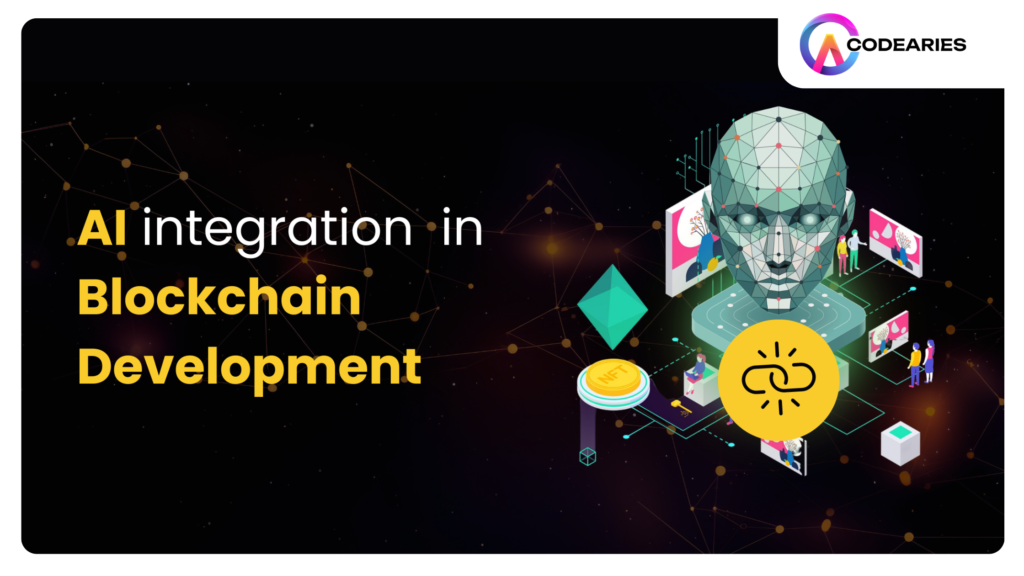The convergence of artificial intelligence (AI) and blockchain technology represents a transformative frontier with the potential to reshape multiple industries. By leveraging the strengths of both technologies, their integration offers solutions to existing challenges while unlocking new opportunities. Because of the decentralized, immutable design of blockchain, AI may operate in environments where data integrity and confidentiality are essential. This synergy also fosters increased transparency because smart contracts automate and streamline operations and blockchain technology enables verifiable data histories. Additionally, AI’s capabilities can be harnessed more effectively through decentralized networks, reducing biases and enhancing fairness in model development.
This article explores the complex relationship between blockchain and AI and how the emergence of blockchain apps with AI integration is changing the digital world.
Importance of AI in Modern Technology
AI’s impact on various sectors is undeniable. From healthcare and finance to transportation and manufacturing, AI is revolutionizing how industries operate. It plays a pivotal role in advancing blockchain technology, creating a synergistic dynamic that enhances the strengths and addresses the challenges of both. Blockchain constructs a distributed point-to-point system, which is a secure and verifiable mechanism for decentralized transaction validation and is widely used in financial economy, Internet of Things, large data, cloud computing, and edge computing. On the other hand, artificial intelligence technology is gradually promoting the intelligent development of various industries. As two promising technologies today, there is a natural advantage in the convergence between blockchain and artificial intelligence technologies.

Here’s why AI is essential for blockchain:
Data Analysis and Insights
Blockchain generates vast amounts of data, which can be overwhelming to analyze manually. AI excels in processing this data efficiently, uncovering valuable patterns and insights that would otherwise go unnoticed. Predictive analytics allows AI to use historical blockchain data to predict future patterns and behaviors, facilitating proactive and well-informed decision-making.
Smart Contracts and Automation
AI can enhance the functionality of smart contracts by automating the execution of complex agreements. This ensures that all conditions are met accurately, reducing the likelihood of errors. Furthermore, by comparing real-time data to predetermined criteria, AI-driven smart contracts make intelligent decisions that improve the accuracy and dependability of automated transactions.
Security and Fraud Detection
In the realm of security, AI is invaluable for identifying potential threats. AI algorithms can detect anomalies in blockchain data, flagging unusual patterns that may indicate fraudulent activity. Additionally, AI can perform real-time risk assessments on transactions, helping to prevent security breaches before they occur.
Scalability and Efficiency
AI contributes to the scalability and efficiency of blockchain networks by identifying and resolving performance bottlenecks. It creates consensus methods that are more efficient, keeping the network safe and functional even as it grows.
Scalability and Efficiency
By integrating intelligent features that provide consumers with individualized experiences, artificial intelligence (AI) can greatly improve decentralized applications (DApps). This enhances DApps’ usefulness while making them easier to use and more approachable, increasing their appeal and encouraging broader adoption.
AI Integration in Blockchain
AI integration in blockchain involves the use of AI algorithms to enhance the functionality, security, and efficiency of blockchain applications. One of the primary ways AI enhances blockchain is through data analysis. Blockchain networks generate vast amounts of data, and analyzing this data manually is impractical. Real-time processing of this data by AI algorithms can yield insightful information that enhances decision-making and streamlines processes.
For example, AI can be used to analyze transaction data on a blockchain network to detect fraudulent activities. By identifying patterns and anomalies that may indicate fraud, AI can help prevent malicious activities before they cause significant damage. Additionally, AI can be used to optimize blockchain networks by predicting network congestion and adjusting transaction fees accordingly. This not only improves the efficiency of the network but also ensures that transactions are processed in a timely manner.
AI-Driven Smart Contracts
Smart contracts are a fundamental aspect of blockchain technology, enabling the automation of agreements between parties without the need for intermediaries. AI-driven smart contracts take this concept a step further by incorporating AI algorithms into the execution of contracts. This allows for more complex and dynamic contracts that can adapt to changing conditions and make decisions based on real-time data.
For instance, in supply chain management, AI-driven smart contracts can automatically adjust the terms of an agreement based on the current market conditions or the availability of resources. This level of automation reduces the need for manual intervention, streamlining the supply chain process and reducing the potential for human error. Moreover, AI-driven smart contracts can enhance the security of transactions by using AI algorithms to detect and prevent fraudulent activities.
AI for Enhanced Security
One of the most significant benefits of AI integration in blockchain is the enhancement of security. AI algorithms can analyze vast amounts of data to detect threats and anomalies that may indicate a security breach. In a blockchain network, where security is paramount, AI can play a crucial role in ensuring that the network remains secure and resilient against attacks.
For example, AI can be used to monitor the network for unusual patterns of activity that may indicate a Distributed Denial of Service (DDoS) attack. By detecting these patterns early, AI can trigger automatic responses to mitigate the attack and prevent it from causing significant damage to the network. Additionally, AI can be used to enhance the security of smart contracts by analyzing the code for vulnerabilities and suggesting improvements to prevent exploits.
Improving Efficiency with AI
Efficiency is a critical factor in the success of any blockchain application. AI can significantly improve the efficiency of blockchain networks by optimizing operations and reducing the time and resources required to process transactions. One of the ways AI does this is through predictive analytics. By analyzing historical data, AI can predict future network conditions and adjust the network’s parameters accordingly to ensure optimal performance.
For example, AI can predict periods of high transaction volume and adjust the transaction fees to incentivize users to process transactions during off-peak times. This helps to prevent network congestion and ensures that transactions are processed quickly and efficiently. Additionally, AI can be used to optimize the storage of data on the blockchain, reducing the amount of space required to store data and improving the overall efficiency of the network.
AI for Decision-Making
In a decentralized blockchain network, decision-making is often a collective process that involves all participants in the network. AI can enhance this process by providing data-driven insights that inform decision-making and help the network reach a consensus more quickly and efficiently. AI algorithms can analyze data from across the network and provide recommendations on the best course of action based on the current conditions.
For instance, AI can be used to enhance the governance of a blockchain network by analyzing the voting patterns of participants and suggesting changes to the network’s rules or parameters. This can help to prevent governance issues and ensure that the network operates smoothly and efficiently. Additionally, AI can be used to improve the consensus mechanisms of a blockchain network by analyzing the behavior of participants and suggesting changes to the consensus algorithm to improve its efficiency and security.
Implementing AI in Blockchain Apps
Successfully integrating AI into blockchain applications requires a strategic approach to maximize its benefits. The initial step involves pinpointing specific use cases where AI can enhance the blockchain application, such as boosting security, optimizing efficiency, or automating tasks. After defining these use cases, selecting the appropriate AI tools and technologies is crucial. Options like TensorFlow, IBM Watson, and Microsoft Azure AI offer the necessary algorithms and computational resources for AI implementation.
Applications of AI in Blockchain Across Industries
The potential applications of AI and blockchain span numerous industries:
Supply Chain Management
- Improved Quality Control: AI detects defects or inconsistencies in products, reducing recalls and improving customer satisfaction through higher quality assurance.
- Enhanced Traceability: Real-time tracking powered by AI ensures product authenticity and compliance with regulatory standards throughout the supply chain.
- Predictive Analytics: AI anticipates potential disruptions and optimizes inventory levels, helping to mitigate risks and enhance operational efficiency.
Healthcare
- Secure EHRs: Blockchain and AI work together to safeguard patient data privacy while enabling secure sharing and analysis of electronic health records (EHRs).
- Accelerated Drug Discovery: AI accelerates the identification of drug targets by analyzing complex biomedical data, expediting the drug development process.
- Pharmaceutical Supply Chain: Blockchain ensures the integrity of drug distribution and prevents counterfeiting, enhancing the overall reliability of the pharmaceutical supply chain.
Financial Services
- Advanced Fraud Detection: AI detects suspicious activities in real-time, significantly reducing financial losses due to fraud.
- Improved Risk Assessment: AI enables more accurate evaluations of creditworthiness and investment risks, leading to better financial decision-making.
- Automated Contract Execution: Smart contracts on the blockchain are enhanced by AI to automate processes, streamline transactions, and minimize disputes.
Energy
- Decentralized Energy Trading: Blockchain supports peer-to-peer energy transactions, fostering a more efficient and sustainable energy market.
- Optimized Smart Grid Management: AI improves the stability of smart grids and facilitates the integration of renewable energy sources.
- Enhanced Energy Efficiency: AI identifies opportunities to reduce energy consumption and optimize usage, contributing to greater overall efficiency.
Gaming
- Secure Virtual Economies: Blockchain creates transparent and tamper-proof in-game marketplaces, enhancing the security and integrity of virtual economies.
- Enhanced Player Experience: AI-powered non-player characters (NPCs) offer a more immersive and engaging gaming experience through realistic interactions.
- Fair Gameplay: Blockchain technology ensures fair gameplay by preventing cheating and verifying game outcomes.
Internet of Things (IoT)
- Secure Data Management: Blockchain-based storage protects the privacy and integrity of IoT data, ensuring secure data handling.
- Device Authentication: AI and blockchain work together to verify device authenticity, preventing unauthorized access and attacks.
- Smart City Applications: AI-driven analysis of IoT data optimizes urban services, including traffic management and sustainability efforts, making cities more efficient and responsive.
By effectively combining AI with blockchain, organizations can drive substantial improvements in operational efficiency, transparency, and trust across various sectors. As these technologies continue to evolve, their integration is likely to unlock even more innovative applications and transformative solutions.
The Future of AI and Blockchain
As AI progresses and blockchain evolves, their combined capabilities are anticipated to offer substantial advantages. Here are some key trends and predictions:
Enhanced Security
AI’s advanced anomaly detection and predictive analytics are expected to strengthen blockchain security, increasing resilience against potential threats and cyberattacks.
Improved Efficiency
By optimizing blockchain consensus algorithms, AI can significantly reduce transaction times and lower energy consumption, leading to more efficient blockchain operations.
Greater Interoperability
AI can facilitate the integration of diverse blockchain networks, promoting seamless data exchange and fostering collaboration across various platforms.
New Applications
The fusion of AI and blockchain is likely to spur the creation of innovative applications, including decentralized autonomous organizations (DAOs), enhanced supply chain transparency, and advanced digital identity verification systems.
Data Privacy and Governance
AI can play a crucial role in maintaining data privacy and ensuring regulatory compliance, addressing critical issues related to data ownership and usage.
How can Codearies help you?
At Codearies, we specialize in harnessing the power of artificial intelligence (AI) to enhance blockchain development, driving your business to new heights of innovation and success. Our expert team leverages cutting-edge AI technologies to integrate seamlessly with your blockchain solutions, optimizing performance, security, and functionality. From developing sophisticated AI algorithms for smart contracts to implementing AI-driven analytics for real-time data insights, Codearies ensures your blockchain applications are not only state-of-the-art but also strategically aligned with your business goals. Let us help you unlock the full potential of AI and blockchain technology to elevate your online business and achieve unprecedented growth. Book a free consultation with us today to explore how we can transform your digital strategy.
Conclusion
AI integration in blockchain app development is revolutionizing how industries operate, providing enhanced security, efficiency, and automation. The synergy between AI and blockchain is unlocking new possibilities for innovation and driving the digital economy forward. As these technologies continue to evolve, their integration will become increasingly important, offering significant benefits to businesses and consumers alike. The future of AI and blockchain is one of collaboration and synergy, and those who embrace these technologies will be at the forefront of the digital revolution.
FAQs
How is AI enhances used in crypto?
AI enhances the cryptocurrency sector by boosting security through real-time fraud detection, forecasting prices with predictive analytics, automating trades to improve efficiency, optimizing smart contracts, and aiding in portfolio management with tailored investment recommendations.
What are the top 3 AI cryptocurrencies?
- SingularityNET (AGI): A platform for creating and monetizing AI services.
- Numeraire (NMR): Powers Numerai’s machine learning models for market predictions.
- Ocean Protocol (OCEAN): Facilitates secure data sharing for AI development.
Can AI write Blockchain code?
AI can assist in coding by generating snippets, suggesting optimizations, and identifying errors, but human developers are still needed for complex and tailored blockchain solutions.







